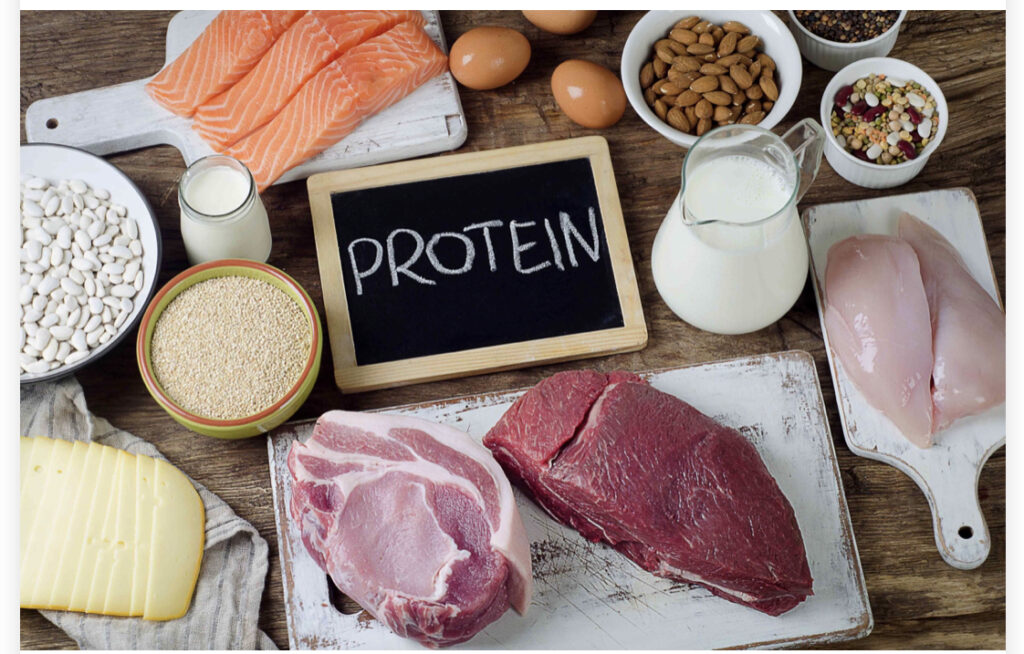Resources
Protein And Recovery: A Quick Guide

What is it actually?
Proteins are complex macronutrients made up of up to 20 different amino acids that provide 4 calories per gram. 20 grams of protein has 80 calories. Proteins support muscle, bone, and collagen growth, development and recovery. Proteins are also involved in immune support, cell growth, and metabolism. Proteins do provide energy but should not be a primary source of energy. That would be catabolism. Protein has too many important things to do than provide energy, leave that job to fat and carbs.
So, how much do I need?
Protein needs are based on age, body weight, training goals, and needs for recovery from injury. Inadequate protein results in increased risk of injury, poor recovery, and depressed immune system. Too much protein that is not used results in weight gain and/or just expensive calories. Athletes who focus too much on protein foods also run the risk of not getting enough carbohydrate from sources such as grains and fruits. Only individuals with kidney problems need to be extra cautious about consuming too much protein.
Where can I get protein?
The best protein sources are what we call “complete” proteins because they have all 9 essential amino acids. Complete proteins include whey, casein, albumin (egg), and soy. Foods containing complete proteins include milk, yogurt, cheese, meat (fish, poultry, beef), eggs, and many protein supplements. Soyfoods (tofu, tempeh, soy milk) are one of the few vegan foods with all 9 essential amino acids. Quinoa is the only grain considered a complete protein.
What is the best time to consume protein?
Getting adequate protein throughout the day is the best way to ensure you are meeting your needs when your body needs it. You are not just recovering after a workout, you are recovering all day long, including non-workout days. Your body absorbs protein better in smaller doses (20-40 g). Larger and older (>50 years old) individuals should aim for 30-40 grams of protein per dose, smaller individuals need 20-30 grams per dose with 3-5 doses per day. A “dose” is a meal, snack, or shake. Check out this link for food protein sources.
What about carbohydrates?
Carbohydrates are more important than protein pre-workout, but are just as important as protein for post workout recovery. If you are taking creatine monohydrate post workout, you need at least 30 grams carbohydrate to facilitate absorption. If you are trying to lose weight, cut out junk food, not fruits, vegetables and whole grains.
Protein supplements should be included in your total daily protein needs. Use actual body weight, not goal weight. Take your daily protein needs and divide by 3-5 to get a dose. Ac170 pound person needing 120 g per day should get 30 g x 4 per day.
Let’s talk protein supplements and meal replacement
As long as your complete protein requirements are met, individual amino acid (AA) requirements should be met as well – Whey, casein, soy, egg, meat, hemp proteins are all “complete” there are no need for additional AA supplements. Individual amino acids in general are not as well absorbed as those in a complete protein package. There are potential risks associated with AA supplements for example, large doses of single AAs can prevent the absorption of other AAs, which may lead to diarrhea, dehydration and malabsorption. This can indirectly cause deficiency of other AAs as a result.
Things to know about amino acids (AA’s)
Arginine and Glutamine are commonly used together and are good post workout, recovery amino acids. ‒ Arginine is commonly found in a lot of your pre-workout, “NO” products
‒ Taken pre-workout, arginine can suppress growth hormone and drop blood pressure, thus it should be taken POST workout as a recovery supplement
‒ Arginine interacts with a variety of medications so check with your doctor before supplementing ‒ Glutamine is good to use if you have GI issues associated with running and training (5g/day)
‒ Safe doses Arginine at 7 grams and Glutamine at 5 grams per day POST workout
Branched chain amino acids are popular as a supplement among athletes
– BCAAs = Leucine, Isoleucine, Valine
– Claims mainly center on decreasing muscle soreness and improving either performance or recovery from exercise – Doses can range from 2 to 7 grams day If you choose to take a BCAA supplement, follow the dosing recommendations below:
– BCAA – 144 mg/kg body weight (70 kg or 155 pound athlete would take 10 grams)
– Leucine – baseline needs are 34 mg/kg (70 kg or 155 pound athlete needs 2.4 g/day), UL 500 mg/kg, recommend 2-3 g 2-3 times a day for recovery. Easy to get through non-vegan protein sources.
– HMB is a metabolite of leucine. Ideal dose is 3g/day.
– Keep in mind that your whey protein is 25% BCAA, 30 g of whey protein provides 7.5 g of BCAA – 40% BCAA is LEU. 7.5 g BCAA = 3 g LEU
– Most non-vegans consume enough BCAA if they are consuming enough protein
In Short
Some protein supplements are really high in protein and don’t have enough carbohydrate by themselves. Keep in mind that you may only need half the recommended dose on the label (20-40 g protein per dose). Popular protein powders that are also easily digestable include grass fed whey, pea protein and collagen. Try adding in oatmilk, coconut milk or grass fed dairy to add in a carbohydrate source. And remember, if you are a meat eater chances are you are already sufficient in the AA’s listed above.
Want to maximize your protein input and build strength? Contact our clinic to find out more about working one on one with our personal trainers and physical therapy doctors, or join The Movement program.
Content by, Trisha Stavinoha, MS, RD, CSSD, CSCS, [email protected]
Comments are now closed.
One Reply to “Protein And Recovery: A Quick Guide”